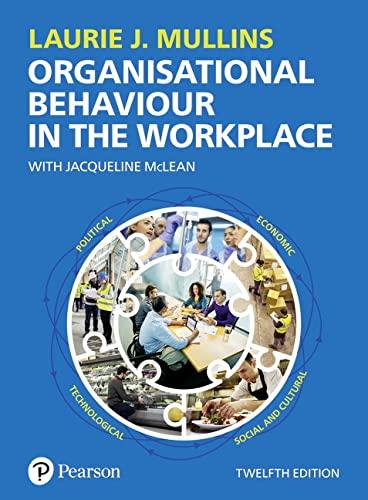Question
Organisation development (OD) interventions often produce positive change results. Interventions that rely on participation of organisational members can create openness and trust among co-workers and
Organisation development (OD) interventions often produce positive change results. Interventions that rely on participation of organisational members can create openness and trust among co-workers and respect for others. Interventions can also help employees understand that the organisation wants to promote risk taking and empowerment. "Living" these characteristics can lead to better organisational performance. However, a change agent involved in an OD effort imposes his or her value system on those involved in the intervention, especially when the intervention addresses co-workers mistrust. The change agent may deal with this problem by bringing all affected parties together to openly discuss their perceptions of the dilemma.
Although many change agents are well versed in OD practices, sometimes they walk a fine line between success and failure. To resolve personal problems in the workplace, participants must disclose private, and often sensitive information. An individual can refuse to divulge such information, but doing so may carry negative ramifications. For example, it could lead to lower performance appraisals, few increases, or the perception that the employee is not a team player.
On the other hand, active participation can cause employees to speak their minds. But this also carries risks. For instance, imagine that an employee questions a manager's competence. This employee fully believes the manager's behavior is detrimental to the work unit, but his or her reward for being open and honest could be retaliation from the boss. Although, at the time, the manager might appear receptive to the feedback, he or she may retaliate later. In either case, participation or not, employees could be hurt. Even though the intent was to help overcome worker mistrust, the result may be more backstabbing, more hurt feelings, and more mistrust.
Questions:
All the answers to the questions need to provide rational explanation and appropriate justification. You are encouraged to support with relevant example(s).
- Do you think there is a risk of co-workers being too open and honest under this OD intervention? Why or why not? You are required to provide a rational explanation and valid justification.
- What do you think a change agent can do to ensure that employees' rights will be protected? You should provide relevant approaches and effective strategies.
Step by Step Solution
There are 3 Steps involved in it
Step: 1
Question 1 Risk of Coworkers Being Too Open and Honest Under OD Intervention Yes there is a risk of coworkers being too open and honest under this OD intervention This risk stems from the delicate bal...
Get Instant Access to Expert-Tailored Solutions
See step-by-step solutions with expert insights and AI powered tools for academic success
Step: 2

Step: 3

Ace Your Homework with AI
Get the answers you need in no time with our AI-driven, step-by-step assistance
Get Started


